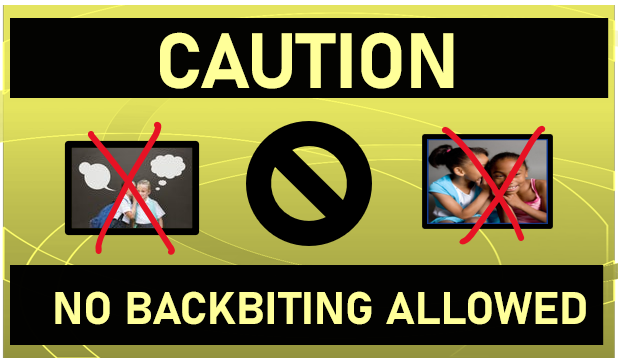We all know that backbiting is haram, don’t we? Yet it remains a MAJOR sin that it underemphasised in today’s Muslim society. Unfortunately, backbiting is widely practiced in families and amongst peers at workplaces and educational institutions. Moreover, it is portrayed as a norm in movies and dramas, which can influence the viewers (who, in sha Allah don’t include us, but may include those around us). These factors make us more likely to succumb to pressure and fall into the same sin.
This article is aimed at helping keen Muslims abstain from backbiting, and we will discuss how to discourage it in our sphere of influence. Also, as a bonus, there is a printable checklist at the end that you can use to navigate yourself through your journey of Saying NO to Backbiting.
The first thing to do in this ‘journey’ is to acknowledge that backbiting is wrong and that it should be stopped. Unfortunately, a lot of Muslims who backbite don’t accept that they do it; others are aware that they backbite but don’t make the efforts to stop it. They consider it harmless or insignificant, both of which have dangerous consequences with regards to faith.
Second, you need to reflect deeply on what you have said, as well as its implications. A simple question to start with is: Would I like it if someone said that about me? A lot of the times, we say things about people, without really meaning them, just for fun, or to fit in. However, it is shaytaan who makes it look fun to us; and these sins decrease our faith and impact our relationship with Allah. In the Quran, the parable given about backbiting is like eating the flesh of a dead brother. Certainly, if someone is committing this grave sin, Allah is not very happy with him.
Similarly, you need to think about how it impacts your relationship with the victim. Your words must have caused damage to his/her reputation or honor in society. Interestingly, it also causes you to lose your respect and other people’s trust. This is because the ones who hear you backbite may expect you to do the same behind their backs—especially when a conflict arises.
Third, you need to apologize to the victim and ask for forgiveness whether he/she found out or not. However, if the victim hasn’t found out, then do it without being explicit, for example, “Please forgive me if I ever did anything wrong”. This is because mentioning what you have done may hurt the person’s feelings and break ties which is not what is intended.
Furthermore, you should pray for forgiveness of the person we backbit about as a compensation for the mistake and of course, apologize to the Creator and repent so that we are not punished for it on the Day of Judgement. Keep in mind that you shouldn’t go to the extreme of making a promise to never talk about that person ever again. It’s normal to feel emotional at the time of repentance, but making a promise like this will make life difficult in the long run, which is neither the purpose of the change, nor is it helpful.
Fourth, you need to change your habits and work on preventing this in the future. Changing habits needs training: relive the scenarios in which you had backbitten and think of how you would modify the way you spoke. Doing this multiple times will help you later whenever you feel like talking about someone.
In addition, make it clear to those you used to gossip with, that you have changed and won’t participate in backbiting anymore, in sha Allah. Then, if you ever catch yourself backbiting subconsciously, discontinue talking and let them know that what you were talking about was unethical and inappropriate. However, if you realize after you have already backbitten, then repent to God and bring back the topic in your next encounter with the same people to condemn your act.
Another idea is to try engaging in useful discussions only and keep the remembrance of Allah as part of the discussions. This will help to distance you from evil thoughts and speech, in sha Allah. It is narrated that the Prophet ﷺ did not sit in a gathering and conclude it without saying what is known as ‘The Expiation of Assembly’: ‘Glory is to You, O Allah, and praise, I bear witness that there is none worthy of worship except You, I seek You forgiveness, and I repent to You, (Subḥānaka Allāhumma wa biḥamdika, ashhadu an lā ilāha illā anta, astaghfiruka wa atūbu ilaik)’. By saying this dua, whatever occurred in that sitting would be forgiven. However, that doesn’t mean that we can deliberately backbite and then read this afterwards to be forgiven!
Alongside this dua, you should also ask Allah to guide yourself and those who backbite around you so that you stop backbiting. It may be that Allah writes their guidance through you, and according to multiple narrations, guiding someone to Islam is better than having the most valuable possessions of this world.
Which brings us to the fifth point: Educating the people you influence to stop backbiting. The first set of people you need to educate are those whom you are responsible for— this includes your younger siblings, juniors, etc. But it doesn’t mean you should ignore a senior who talks to you about other people behind their backs. In fact, you need to act wisely when conveying the message to a senior. The following techniques can be applied to any person in your sphere of influence, in sha Allah.
Start off by setting an example: don’t reveal identities when you talk about people; let the listeners know that you won’t mention their names because it’s not allowed in the religion. As for the situation where people are backbiting in front of you, there are a few ways to handle it.
An indirect approach would be to praise or defend the person they are talking about according to the context. For example, if someone said, “she has such a fat nose”, reply, “Are you laughing at Allah’s creation? Besides, I love the way she looks, she is beautiful, isn’t she?” Or if someone said, “he saw my text and ignored it, I told you he was rude”, reply, “maybe he is sick, or so disturbed, let’s call him to see if he is okay.”
This clever trick serves two purposes: it cancels their intended harmful effect (if it is harmful), and it discourages them from talking bad about him because they’ll feel embarrassed as you seem like his close friend. Also, this is most suitable for seniors because it doesn’t involve any confrontation.
On the other hand, a very direct approach (and this would probably work best with peers and subordinates) would be to interrupt them politely and ask whether the person they are talking about is happy for them to discuss this piece of information behind his back. This is an effective approach because it pauses the ongoing sin and encourages a healthy debate about backbiting.
But if they continue to backbite, just leave them. Whether it’s angrily or by using an excuse depends on your situation. And if you must, change your circle and hang around with people that don’t backbite. It’s possible that this act of yours leaves an impact on the ones you left, even if they don’t show it, and they might change later, in sha Allah.
Overall, this journey of Say NO to Backbiting is so important because it can prevent us from sinning, have our previous sins forgiven, and allow us to gain a lot of rewards, by Sadaqah Jariah. This is why we have created a checklist that guides you through your journey, so you don’t miss a single step! And it’s so important because it’s very easy to resist to change, and to promote something difficult to follow. But at the end of the day, we need to uphold the Islamic principles, even if it means being uncomfortable, unwanted, or alone.





